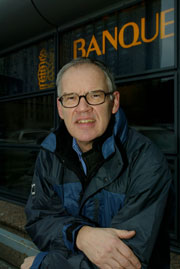
Economics professor James
McIntosh
Photo by Andrew
Dobrowolskyj
|
by Sylvain Comeau
James McIntosh doesn’t waste any time cursing bank fees or service.
He’s too busy examining the issue of bank mergers, and he has found
that they would be good for this country, not just for the banks.
At the end of November, the Concordia professor of economics made a presentation
to the Senate Banking Trade and Commerce Commission, a Senate committee
that held hearings on bank mergers. McIntosh presented a paper he had
written that was published in the Canadian
Journal of Economics in which he concluded that the government
should give banks the green light.
“Bank mergers are in the public interest, for two main reasons. First,
Canadian banks are characterized by increasing economies of scale; that
means that the bigger the bank, the lower its unit costs. It’s like
WalMart; they are a cheaper store than the Bay because they are a lot
bigger; they can save money by doing discount buying and economizing on
expenses. The same is true with bigger banks; they will be able to lower
their fees, and it will be in their interest to do so, because they want
to sell more banking services.”
One popular objection to bank mergers is that reduced competition will
lead to higher fees, but McIntosh contends that economies of scale will
be the dominant factor. That was the conclusion of computer models he
ran to simulate the results of mergers in an oligopoly situation (a market
controlled by a small group of competitors).
He also argues that mergers would increase profits at the banks, which
is good for Canadians, many of whom own shares in the big six chartered
banks.
“Bank profits are distributed to individuals, people with pension
funds or mutual funds — those are the people who own the banks. John
Q. Public benefits from bank profits, not just bank executives. In addition,
banks make a huge contribution to Revenue Canada, in the form of 37 per
cent of their profits paid in taxes. The Royal Bank made $2.75 billion
this year, which means about $900 million paid in taxes. If we need $5
billion to improve the health care system, banks will provide a very large
chunk of that.”
Aside from the domestic market, the banks have often cited competition
from giant international competitors as a reason for merging; in other
words, they need to get bigger at home before taking on the big boys on
the world stage. McIntosh wonders why we would not want them to do so.
“Canadian banks are afraid of competitors like [Holland bank] ING
Direct or [American bank] Wells Fargo, who offer virtual banks; today,
you can get a mortgage or a loan approved online. Wells Fargo can do that
because they are big; they have a huge financial base. The Canadian banks
say, ‘If we could get big like Fargo, we could do it too,’ and
the government is saying, ‘No, you can’t.’ Right now, they
can’t afford to take the risk, because it costs $500 million to set
up a virtual bank.”
While Canada’s banks may appear monolithic to the average Canadian,
McIntosh points out that our biggest financial institutions barely crack
the top 50 of the world’s biggest.
“They are really small compared to international banks. They want
to be the merchant bankers for Canadian corporations, but at the moment,
Canadian corporations like Bombardier, Alcan and GM of Canada use big
American banks for their IPOs, mergers and acquisitions. The reason is
that Canadian banks are just not big enough.”
In addition, McIntosh points out that financial services could become
a major Canadian export. He cites the insurance sector as a dynamic model
for that.
“If you look at the insurance business, companies like Manulife Financial
and Canada Life, they do more business outside of Canada than inside.
And this is good; it means we’re exporting financial services, and
the head office jobs are here in Canada.
“A country has to export something, and it’s better to export
high quality, high value added commodities that employ skilled people,
rather than things like paper or manufactured goods. We couldn’t
compete in a lot of categories of manufactured goods because they are
usually made in countries with lower labour costs. We want to be more
like the Swiss and the Dutch, who specialize in products that have high
human capital requirements.”
Despite all these reasons for mergers, McIntosh acknowledges that the
banks may well be turned down again because of continued sour public sentiment.
“This is hard to sell politically, because everybody hates banks.
That’s just a fact, and then when you tell them the banks are going
to get even bigger … they don’t react too well.”
McIntosh’s paper on bank mergers was funded by the Royal Bank and
Bank of Montreal, but he emphasizes that he is an academic who came to
similar conclusions in previous, unfunded papers he wrote about the possibility
of mergers among insurance companies.
|
|
|



